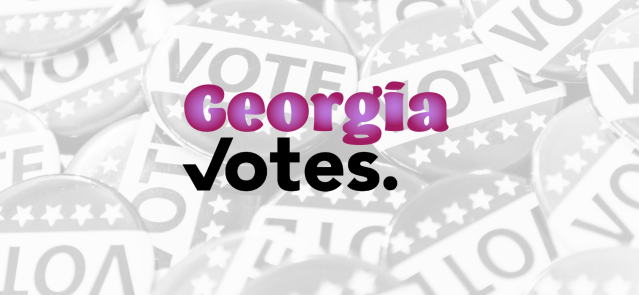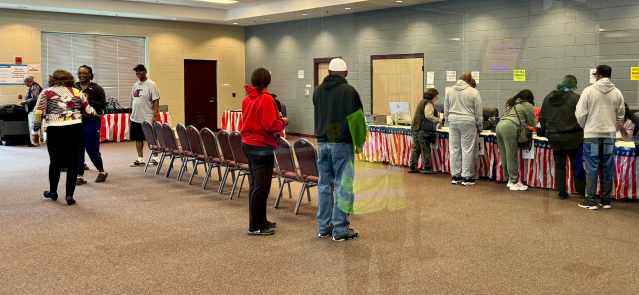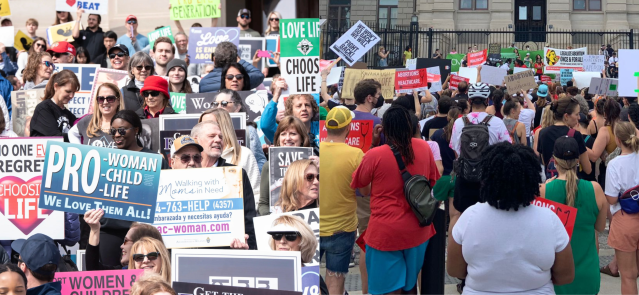Stay ahead of the curve as a political insider with deep policy analysis, daily briefings and policy-shaping tools.
Request a DemoLegislative Black Caucus calls out racial disparities and socioeconomic inequities in Georgia at annual conference
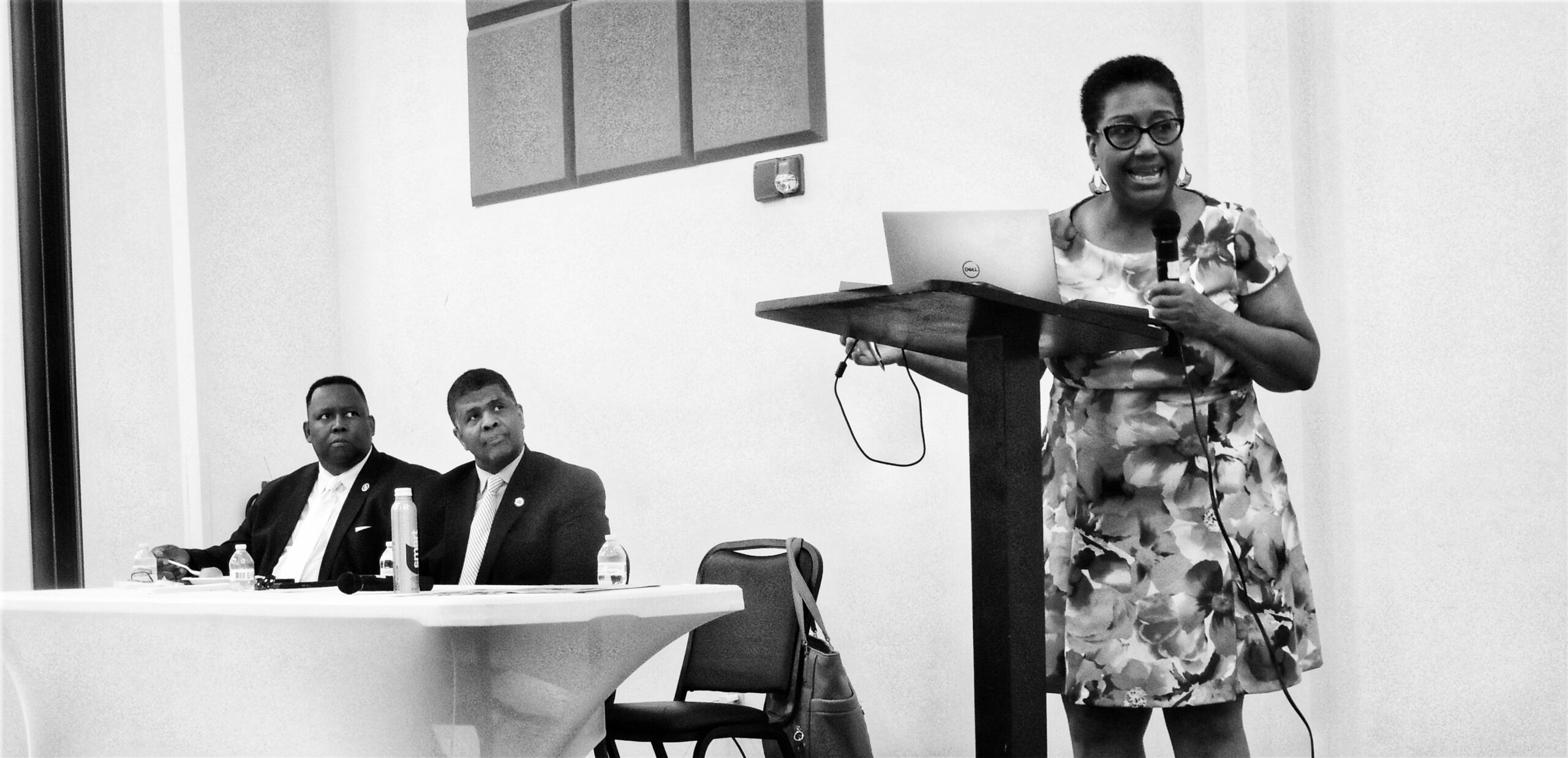
GLBC Chair Carl Gilliard and John Moye, policy and legislative affairs director of the Urban League of Greater Atlanta (ULGA) listen as Nancy Flake Johnson, president and CEO of ULGA, presents “The State of Black Georgia” report to Black legislators and civic leaders in Savannah on July 21, 2023. (Credit: Jill Jordan Sieder).
SAVANNAH — The annual gathering of the nation’s largest Black legislative caucus kicked off Friday with a presentation by the Urban League of Greater Atlanta on “The State of Black Georgia,” which pointed out racial disparities across the state in the areas of economics, education, social justice, health, and civic engagement.
Black legislators and civic leaders present called for legislation and policy to address the inequities and challenges highlighted in the report.
What’s Happening
About 40 of the 68 members of the Georgia Legislative Black Caucus (GLBC) are meeting with other elected officials, business, faith and community leaders and constituents in Savannah this weekend in a series of panel discussions, speeches and strategy sessions to explore “evidence-based solutions to problems and challenges affecting African Americans, people of color and disenfranchised Georgians,” according to the event agenda.
The annual GLBC conference began at the Ralph Mark Gilbert Civil Rights Museum on Friday morning with a presentation by Nancy Flake Johnson, president and CEO of the Urban League of Greater Atlanta.
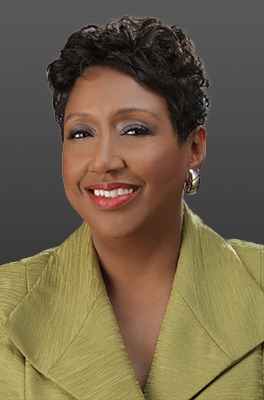
Over a breakfast of shrimp and grits, she led about 50 legislators and civic leaders gathered there through the key points of “The State of Black Georgia 2022,” a 124-page report she described as the outcome of an effort by the Urban League to conduct data analysis and to collect input from community leaders in six cities “that represent the social, cultural, and economic hubs for Black Georgians – Albany, Atlanta, Augusta, Columbus, Macon, and Savannah,” as well as from Black leaders in rural areas.
Why It Matters
Johnson said leaders in all but one region ranked economic issues as the most pressing for Black Georgians, particularly inadequate access to livable wage employment opportunities, and a lack of affordable housing.
The Urban League engaged an urban planning and research firm to collect local and statewide data. The study found that median household income for a Black family in Georgia is $46,964, while the median household income for all races is $61,224. In Atlanta, the median income for a Black family is $28,105, while a white family’s median income is $83,722.
“And what breaks my heart is the poverty rate is over 30% in every region,” said Johnson. “In Albany, it’s 49%. We all knew it was bad. I didn’t know it was collectively this bad.”
The report found other disparities related to race. Black Georgians, per the 2020 census, make up about 32% of the state’s population, and 29% of the active voting population, according to the Georgia Secretary of State. But of the total state population below the poverty line, 44% are Black. Of the total households that do not have a computer, 42% are Black. Of the total workers that commute to work via public transportation, 62% are Black. Of the total businesses in the state of Georgia, only 6% are Black-owned.
Johnson noted that Georgia has been ranked “the number one state to do business” [by Area Development magazine] for the past nine consecutive years, but said Black-owned firms have not been adequately included, particularly in state procurement contracts. She referenced two “disparity studies” conducted by the state Department of Transportation that showed disproportionately low participation among Black-owned businesses — one in 2012 that showed 2.4% Black participation, and one in 2016 that showed 1% Black participation in state procurement contracts.
“While we don’t have the capacity to do 32% of procurements, we certainly do have the capacity to do more than 1%,” said Johnson.
The report noted the effort last session of Rep. Roger Bruce, D-Atlanta, and other legislators to establish an Office of Minority Business and to expand data collection across all state agencies. The bill, which did not move, is an attempt to build on the executive order signed by Gov. Brian Kemp in July 2022 which created a Small Business and Supplier Diversity Manager position, and to continue the momentum within the Department of Administrative Services to address the needs of small, women- and minority-owned businesses.
“However, for real movement to address the deep disparities that exist, significantly more financial and staff resources must be invested in state-wide, action-oriented, equity focused strategies as a priority to measurably expand MBE [Minority Business Enterprise] utilization,” the report said. “The anchor institutions and the private sector must also expand their supplier diversity efforts and invest more resources in MBE development and capital investments.”
The education portion of the report focused on the poor literacy rates of young Georgians, and Black students in particular. It noted that literacy and reading levels by third grade are critical to a child’s academic success, citing a study by the Annie E. Casey Foundation that found students who are not proficient in reading by the end of the third grade are four times more likely to drop out of high school than proficient readers. Another study by the literacy advocacy organization Literacy Mid-South found strong connections between “early low literacy skills and the U.S.’ exploding incarceration rates.”
“These findings are alarming when you consider the third-grade reading stats for Georgia students,” said the Urban League report, which cited the Casey Foundation’s findings that 36% of third graders across Georgia are not reading at their grade level, and that nearly 22% of Georgia’s Black students in the fourth grade are reading at or above a proficient level, per the Georgia Milestones testing for the 2021-22 school year. “In other words, 78.1 percent of Black students in Georgia have not been taught to read proficiently by the end of third grade,” the report said.
Johnson said that recent raises for public school teachers don’t go far enough, and that making kindergarten mandatory and changing the funding formula for K-12 education in Georgia to factor in poverty are among the education policy recommendations of the Urban League.
“We’re sitting on billions of surplus dollars,” Johnson said. “A lot of those are our dollars, our contributions that we don’t have the power to direct toward a more equitable path.”
Regarding the report’s overall findings of inequities and challenges for Black Georgians “and other poor ethnic groups in the same boat” statewide, Johnson said, “We must feel the weight of the circumstances. It’s heavy and has got to be addressed. We must go forward strategically together … and find reasonable advocates across the aisle … to create more equitable opportunities.” She urged the GLBC members in the room to turn the Urban League’s policy recommendations into legislation.
What’s Next
Rep. Carl Gilliard, chair of the GLBC, told the audience he was “grieving and receiving” during Johnson’s presentation. “We’ve got the facts. Now we’ve got to get serious, engaged and intentional.”
He urged members to make the most of events at the conference addressing economic issues, criminal justice, voting rights and rural healthcare, some featuring nationally prominent Black leaders including Illinois Congressman Johnathan Jackson, former Atlanta Mayor Shirley Franklin, and Bishop Reginald Jackson of the American Methodist Episcopal church.
Afterwards, Gilliard told State Affairs, “We’ve got to do something statewide to address poverty. People in this state — Black and white, Vietnamese and Hispanic — are suffering and cannot afford to live in an environment where the rent is $1,300 a month.”
Gilliard said a high priority of the Legislative Black Caucus next session is to get a hearing in the Ways and Means Committee on a bill to raise the minimum wage, an effort that has not succeeded in recent years.
“The minimum wage should not be $5.15,” he said. “To get people back in the workforce we’ve got to have a livable wage. Right now even $15 an hour is not livable for many families. We’ve got to stand our ground and make a livable wage a major issue in the upcoming session.”
Rep. Sandra Scott, D-Rex, said she would be pushing HB 3, the Support for Students Living in Poverty Act, which would change the Quality Basic Education funding formula for K-12 schools to include an income opportunity weight. Currently Georgia is one of only six states in the country that does not include poverty within local school districts as a factor in school funding.
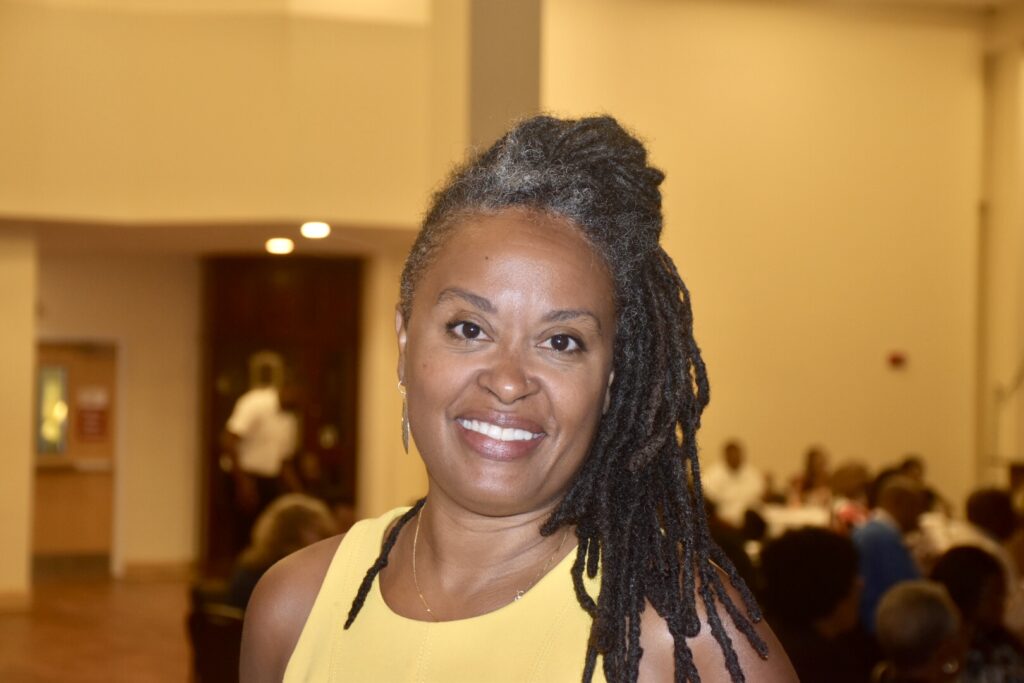
Sen. Nikki Merritt, D-Grayson, said one of her plans to address inequities in education next year will be to “make sure that any sports betting bill that we consider includes funding for K-12 education.
“A sports betting bill, if it passes, is a long-term economic draw, and I will work hard to make sure that some of those funds go to where they’re really needed. The other side is going to need our votes to pass it,” said Merritt.
Also read:
- Legislative Black Caucus seeks to lock in Kemp’s recent efforts to increase diversity in state contracts
- Q&A: Even the Energizer Bunny is no match for Carl Gilliard
- $69.4 billion farm-to-table pipeline: ‘If you’re not at the table, you’re on the menu’
Contact Jill Jordan Sieder on Twitter @journalistajill or at [email protected].
Twitter @StateAffairsGA
Instagram @STATEAFFAIRSGA
Facebook @STATEAFFAIRSUS
LinkedIn @StateAffairs
Header image: GLBC Chair Carl Gilliard and John Moye, policy and legislative affairs director of the Urban League of Greater Atlanta (ULGA) listen as Nancy Flake Johnson, president and CEO of ULGA, presents “The State of Black Georgia” report to Black legislators and civic leaders in Savannah on July 21, 2023. (Credit: Jill Jordan Sieder)
Correction: This story has been updated to correct the number of members of the Georgia Legislative Black Caucus, which has 68 members (not 73, as initially reported) and 10 associate members.
A primer on the Nov. 5 ballot measures: What you need to know
In addition to voting for president and down-ballot candidates in the Nov. 5 election, Georgians will decide on a couple of tax measures and whether to create a statewide tax court. Three questions call for a statewide vote, all of which appear at the end of the ballot. The first time most voters see these …
Tuesday’s early voting turnout sets highest 1-day record in a presidential election year
More than 306,000 Georgians voted on the first day of early voting Tuesday, setting the highest one-day early voting turnout in a presidential election year. Tuesday’s statewide turnout of 306,118 voters more than doubled that of first-day early voting for the general election four years ago, state election officials reported just after 8:30 p.m. Tuesday. “It’s …
Georgia Supreme Court restores state’s 6-week abortion ban
The Georgia Supreme Court reinstated the state’s six-week abortion ban Monday, a week after a lower court judge overturned the controversial measure. The court ordered the stay while it considers the state’s appeal of the lower court ruling. The head of an anti-abortion organization praised the Supreme Court’s decision, which went into effect at 5 …
Weekend Read: Georgia abortion clinics see surge after 6-week abortion ban struck down
While Georgia lawmakers seek to restore the state’s six-week abortion ban struck down earlier this week, some abortion clinics are reporting increased activity as women seek help during what some view as a temporary reprieve in the state law. Fulton County Superior Court Judge Robert McBurney on Monday struck down Georgia’s abortion ban, ruling it …

